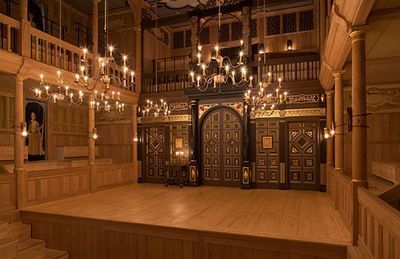Sir Gawain in tight jeans

The Sam Wanamaker Playhouse; © Peter Le May
By THEA LENARDUZZI
Nothing says Christmas like bright berries of blood flecked across an emerald gown. This rather festive image comes by way of Simon Armitage’s translation, published in 2008, of Sir Gawain and the Green Knight, which the poet performed by candle light last night in the Sam Wanamaker indoor theatre at the Globe.
I say performed because, though Armitage read from his book poised on a lectern, he was joined by two actors, the gamine Polly Frame, reading the parts of the knight (in a gruff Scottish accent) and his lady (with soft BBC English ), and a foppishly blond Tom Stuart taking the role of Gawain (from the Home Counties?). Much fun was made of the chasm between role and player, Frame’s “bushy green brows” and “bushy green beard” being nowhere in evidence – and, at a meta-level, with Gawain, a would-be valiant knight whose nervous inexperience was captured in Stuart’s occasional quiver of falsetto.

Simon Armitage; © Helena Miscioscia
The actors, too, read their lines from books held aloft, which hampered their movements about the stage somewhat and once or twice obscured their face – which seems an especial shame in such an intimate venue. This small quibble was almost made up for by the theatricality of Armitage’s shirt – silk, I think, and of a bright emerald hue (sadly, no images are available so this too might pass into myth).
I had not yet been to the Wanamaker and was quite taken aback by its magic: the famous chandeliers; the intricacies of the panelled paintwork; the smell of wood sap, the harp player (Jon Banks) upstage right, strumming time and the passing of the seasons (with the occasional comic interjection); and the venue’s small size, which encourages the kind of personal exchanges between players and audience that would get lost in a larger venue. When, for example, from the poem’s opening, Armitage said, “Now, on the subject of supper I’ll say no more / as it’s obvious to everyone that no one went without” – then looked up, an eyebrow slightly raised – I’d wager that much of the laughter came from a common knowledge that we had all gone without to get there on time.
The tongue-teasers and verbal gymnastics required of the readers – the alliterations and bob-and-wheel patterning of the Middle English text are preserved in Armitage’s translation – made for more merriment. I recall, in particular, the lines recounting an exchange between the mysterious lord, just back from a successful hunt, and his guest Gawain: “And Gawain is quick to compliment the conquest, / praising it as proof of the lord’s prowess, / for such prime pieces of pork / and such sides of swine were a sight to behold”. There is a heightened sense here of a young man hysterically out of his depth. The lines executed, Stuart could look up and wink at his audience. It was all gloriously camp.
But what came across perhaps even stronger was the sense of a text – and a tradition – still very much alive, its contexts and references easily mutating for a modern audience: the line on “the wilds of the Wirral”, for example, “whose wayward people / both God and good men have quite given up on”, a comment of WAG culture; Gawain’s fashionable skinny jeans and flimsy brogues; when Gawain expressed his urgent desire to “link up with [the green knight]”, he might well have said “Link In ®”. Which got me thinking about another evergreen inflection: isn’t there a part of the knight that seems particularly aggrieved by Gawain's being who he is purely because of his relation to Arthur? And indeed, wasn’t it because Gawain was aware of what many in his uncle’s Court must have thought of him – “I am the weakest of your warriors and the feeblest of wit . . . .Were I not your nephew my life would mean nothing” – that he stepped up to the challenge – “I stake my claim, this moment must be mine” – and set heads rolling in the first place?
It was good to see the night’s tale brought to a close by the poet taking a bow with his players. There is something very modern about Armitage’s celebrity (going on book tours; fronting BBC programmes; singing in a rock band), which leaps the chasm to land neatly in line with the bardic tradition.
Peter Stothard's Blog
- Peter Stothard's profile
- 30 followers



